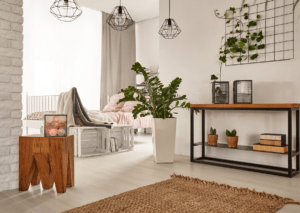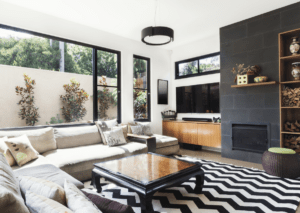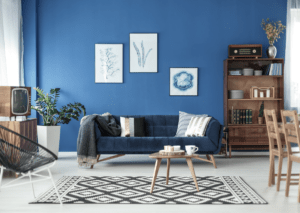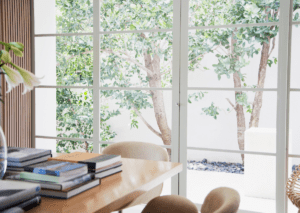What is Feng Shui?

Feng shui is the Chinese art of harmonizing your space to maximize the flow of positive energy. The practice of feng shui is fundamentally about the inherent energy, or “qi”, that objects in a home carry. To understand what type of energy an object offers, feng shui asks you to explore the five elements: wood, fire, earth, metal, and water. It’s believed that positive energy can be gathered through the thoughtful placement of Feng Shui elements in a home. This positive energy aims to ensure good health and fortune. Feng shui also focuses on channelling out negative energy to create harmony.
Balancing the Five Elements

The five elements, earth, wood, fire, water, and metal, can be present in a home physically or symbolically. For example, fire elements can be represented by warm colours like red and orange, or it could be an actual fireplace of candle.
The idea is to reach a balance between all elements. To achieve a balance, pay attention to both the literal and symbolic elements that are presented in your home. Unbalanced elements can be a source of imbalance in your life. It has been found that people are often drawn to elements that they need more of, or cause imbalance in their life. So, if you are someone who deals with aggression, be mindful to not incorporate many fire elements in your home. If you are on the opposite end of the spectrum and find that you lack motivation or passion in your life, you should consider adding more fire elements to your home.
Consider Spatial Relationships

One of the main goals in the practice of feng shui is to maximise the flow of positive energy in your home. To do this, it is crucial to consider spatial relationships within your space. Some find it difficult to create the right balance in your home. So, how can you achieve balance?
- First impressions make a difference: As soon as someone enters your home, the way objects are arranged can affect their mood. Since the front door is the main entryway, avoid crowding that space with furniture or accessories, and instead allow a clear walkway into your space.
- Thoughtfully positioned furniture: The way furniture is placed significantly affects the flow of energy in a room. In the living room, try and place the sofa against a wall to avoid obstructing the flow of “qi”. If this is not possible, position the sofa opposite to the front door, allowing the energy to bounce across the room. In your bedroom, position your bed so it is opposite to the doorway so that you face the door when lying down. By doing this, you assume a ‘commanding position’, which helps you better connect to energy from outside the room and decreases feelings of isolation. The same concept applies to desks in offices.
- Find spatial symmetry: By placing objects in pairs, for example two bedside tables either side of your bed, creates a sense of equilibrium and harmony.
Declutter

In order to have a home with good feng shui, energy should be able to flow through your home freely. It is important to remove all clutter to avoid having stagnant or blocked energy. An excessive amount of clutter can result in reduced clarity of thought and emotion. Decluttering does not only involve the obvious aspects like cleaning out your wardrobe, but also administering effective organisational systems for things like paying bills or recycling. In practice, feng shui is less focused on home styling, and more about creating a calm and healthy living environment.
The Use of Colour

In the feng shui practice, every color has its own meaning and represents something different. For example, red relates to power, and brown embodies balance and stability. Colour can be used to instill energy throughout your home, by adding it to uncharacteristic places like the backside of your door. When incorporating colour into different spaces of your home, consider what the colour represents and how it will alter the mood of the space. A common technique in feng shui used to create a balanced space is to thoughtfully incorporate bright, vibrant hues as features in a largely monochromatic palette.
Reduce the Presence of Technology

Nowadays, having technology in the home may feel unavoidable. While useful, technology can become a focal point and distract us from what is important in life. Concealing technology within your home is a key feng shui technique, to help you become more in tune with the energy of the space. The bedroom in particular is an area where technology, like TV, should be concealed to allow for necessary relaxation and relief. It is understandable that completely eliminating technology may not be an option, however simply concealing your devices is a simple way to restore the balance of energy.
Maximise Light Sources

Light is essential to the practice of feng shui. Light sources symbolise warmth and heat, and have the ability to increase positive energy throughout your home and improve the overall mood. A common feng shui technique used to facilitate the harmonious interaction of energy between objects in the home is strategically placing mirrors in darker parts of the home. This can create the illusion of a larger space by reflecting light from across the room. An important thing to keep in mind when hanging a mirror is to make sure the mirror helps to reflect more light, a nice view, or an expansive part of the room. A good place to position a mirror is opposite a window, in order to amplify an outdoor scenery and increase the space’s exposure to natural energy sources.
Flow to the Front Door

How “qi” can flow through your front door is another important aspect of feng shui. The front door is known as the “mouth of qi”, and is the pathway in which energy can come into your home. The practice of feng shui believes that your front door should be easy to find, with a clear energy flow to the front door. Additionally, the front door should not be directly aligned with another door or a big window, in order to avoid energy escaping without being able to circulate your home. If this can’t be avoided, it is important to try and reposition your existing furniture to redirect the flow of energy. Things to avoid in your entryway include:
- Difficult-to-find front door
- Door hidden on the side or back of the house
- Two or more formal front doors
- Flora blocking the front door
The feng shui principles and practices highlighted in this article can be incorporated into your home life, whether you are looking to redesign your current home, or want to be aware of what to look for when house hunting. For more detailed information about feng shui, you can check out Joey Yap’s website, a feng shui consultant. If you are looking to find your next place to call home, the Relogo team can help you on your journey to find the perfect place for you. Browse our coliving platform for stylishly designed short-term accommodation options, or contact us for other home search enquiries.
As relocation experts, Relogo provides tailored short term accommodation search, moving and storage solutions, pet relocation, and school search, among other complimentary a-la-carte relocation services. If you are looking for more comprehensive help, our team also provides concierge service packages. We are happy to lend our expertise to any enquiries, so don’t hesitate to contact us now.


